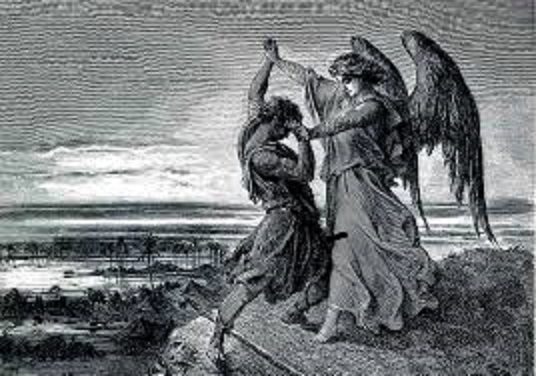Some have entertained angels unawares Hebrews 11:2
I’ve never known what to make of angels. I was bombarded with stories involving them as a youngster, from the angel chasing Adam and Eve out of Eden, to the one who wrestles with Jacob (next Sunday’s reading from the Hebrew scriptures), to the one who brings bizarre news to Zechariah and the one who sits having a morning coffee on top of the stone that’s been rolled away from the empty tomb on Easter morning.

But my favorite angels are from the movies. Consider, for instance, the 1946 Christmas movie classic “It’s a Wonderful Life.” This is a standard at my house (which probably makes my house the same in this regard as about a billion other households). There are many memorable characters and scenes; my favorite is when George Bailey and his guardian angel Clarence Oddbody have a drink at Nick’s, the watering hole in the alternative universe into which George Bailey was never born. George and Clarence get thrown out of the joint shortly after Clarence orders a “mulled wine, heavy on the cinnamon and light on the cloves.” Nick is not interested in customers who want to do anything other than drink hard and fast, and he certainly doesn’t want an old guy dressed in a 19th century nightshirt and claiming to be an angel taking up space and adding “atmosphere” to the bar. As George comments, “you look like the sort of guardian angel I’d get.”
Then there’s Dudley from the 1947 classic “The Bishop’s Wife,” the suave angel who comes as an answer to the prayers of Bishop Henry Brougham, who is struggling to raise money for the building of a new cathedral. Dudley’s mission turns out to be spiritual guidance rather than money-raising, a mission complicated by his increasing attraction to the Bishop’s lovely but neglected wife Julia. In both movies one learns that if angels exist, they almost certainly are not at all like what traditional art and sacred texts suggest. No wings flapping around here (although Clarence apparently gets his at the end of “It’s a Wonderful Life” upon the successful completion of his first solo mission).
I don’t know if I believe in angels as supernatural beings or not, but I’ve always liked the “entertained angels unawares” idea, thinking of angels not as non-human messengers from heaven but rather as unexpected vehicles and facilitators of goodness. The saying reminds me, first, that I never know which seemingly random person who drops into my life might be an unexpected game-changer. Second, I never know when I might unwittingly be a game-changer in someone else’s life. I’ve had many angels in my life—I’ve been with a certain red-headed one for almost thirty years; one of the most important was a close-to-three-hundred pound angel with a patrician New England accent.
My first teaching job after graduate school was at a small Catholic university in Memphis that focused primarily on engineering and business. They needed a philosopher (I was one of two philosophers in the six person Religion and Philosophy department) to teach a lot of Business Ethics (I taught four or five sections per semester). It was a good “starter job” and was tenure-track, but Jeanne and I hated Memphis and I couldn’t see myself teaching Business Ethics for the rest of my career. I started applying for positions in places like the northern Midwest and the Northeast immediately, but the job market was tight (as it still is) and we were worried. Then a very large angel dropped into our lives.
The aging President of the university, Brother T., was such an incompetent holy terror that the university’s board created the position of Provost specifically in order to take the day-to-day operations away from Brother T. and nudge him into a retirement sunset. After a national search, David was hired as the new Provost. The university was small enough that even I, a junior faculty member just starting his second year at the place, met the new Provost within a few days of his arrival; David’s office was just one floor down from mine. He was a breath of fresh air for Jeanne and me.
David was a native, patrician Bostonian, spoke with an accent that we understood, was cultured and refined in ways that we appreciated, and had the wonderful Northeastern forthrightness and honesty that we embraced as opposed to the Southern hospitality and “charm” with which we did not resonate well. David was a wine connoisseur, had read just about everything, had wide-ranging interests, and had a heart as expansive as his waistline. And he was a Red Sox fanatic. Jeanne and I welcomed him like a long-lost older brother.
I don’t recall how I mustered the nerve to ask David for help escaping from the very institution where he had just been hired as Provost and day-to-day operations manager. I was only in my second year of teaching, my position was tenure-track (something many newly-minted professors nationwide would have killed for), and comparatively speaking I had nothing to complain about.I came to his office on the morning of our scheduled appointment with “fear and trembling” of Kierkegaardian proportions, expecting him to do what a good Provost should, deflect my concerns positively (“It isn’t really that bad here,” “We need people like you here to raise the bar”) or shoot them down (“Shut up and do your job. No one likes a whiner”). Instead after a few minutes of intent listening (something few administrators do as well as David did), he smiled and said “I’m not surprised. You are too good for this place.”
For a relatively new and still insecure teacher such as I, this was manna from heaven. “Tell you what,” he continued. “Let me take a look at your dossier; we’ll meet again next week and I’ll make some suggestions.” And so my boss took on the task of helping me make my dossier more attractive to a prospective boss at a better place. Only when angels get involved does this sort of thing happen.
David was as good as his word and more. Over several meetings that fall, he helped me revise my curriculum vitae, learn how to sell myself in ways a severe introvert would never think of, and begin to grow into the confidence as an academic that he saw in me long before I saw it myself. And it worked—not that academic year, but the next one. I landed my dream job at Providence College, where I am now in my twenty-fourth year, we shook the Memphis dust off our sandals and never looked back.
David unfortunately was not in Memphis to celebrate with us; he also was too good to be there for long. In the spring semester of his first and only year in his new position, Brother T. attempted to force David into making executive decisions that David’s strong moral convictions and big heart of generosity could not live with. Rather than compromise, he chose to resign—to the great dismay of the faculty and students who had come to respect and love him in the few short months he had been on campus. I can still see the huge banner the students draped off the side of an overpass outside the front gate of the college on the morning the word broke that David was leaving: DR. R—–, PLEASE DON’T LEAVE US!
Jeanne and I stayed in touch with David over the subsequent years as we went to Providence and as he became a higher education administrative gypsy, taking positions at colleges in Pennsylvania, New Jersey, Connecticut and probably others I have forgotten. We learned over time that he was a frustrated professor; despite a PhD in classics from Yale, life’s contingencies eventually plopped him in administration rather than in the classroom where he belonged. David visited us occasionally, we had the opportunity to return his generosity and write him letters of reference for new positions he sought, and he even took a thousand-mile nonstop road trip with us back to Memphis to celebrate the retirement of the athletic director at the college we all had been so anxious to leave.
Despite many attempts, David never did lose the weight and sadly succumbed to a fatal heart attack several years ago. I miss him. I’m not sure David ever fully understood how important he had been in my life, probably because I’m only fully understanding it myself now, twenty or more years later. David didn’t have wings and neither do I, but I pray that if a chance to be an angel for someone else arises unexpectedly in my life, I won’t miss the opportunity. I’m eternally grateful that David didn’t miss his opportunity with me. If there is a heaven, David is undoubtedly drinking fine wine with other portly angels such as Thomas Aquinas and William Howard Taft, while cheering on the Red Sox with Babe Ruth.













